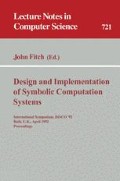Abstract
We introduce an algebraic model of computation which is especially useful for the description of computations in analysis. On one level the model allows the representation of algebraic computation and on an other level approximate computation is represented. Furthermore programs are themselves algebraic expressions. Therefore it is possible to algebraically manipulate programs of symbolic and numerical computation, thus providing symbolic computation with a firm semantic foundation and giving a natural model for mixed symbolic-numerical computation. We illustrate these facts with examples.
Preview
Unable to display preview. Download preview PDF.
References
Aberer, K. (1990). Normal Forms in Function Fields. Proceedings ISSAC '90, 1–7.
Aberer, K. (1991): Combinatory Differential Fields and Constructive Analysis. ETH-Thesis, 9357.
Aberer, K. (1991): Combinatory Differential Fields: An Algebraic Approach to Approximate Computation and Constructive Analysis. TR-91-061, International Computer Science Institute, Berkeley.
Aberer, K., Codenotti, B. (1992). Towards a Complexity Theory of Approximation. TR-92-012, International Computer Science Institute, Berkeley.
Barendregt, H. (1977): The type free lambda calculus. Handbook of Mathematical Logic, ed. Jon Barwise, North Holland.
[Blum et al., 1989] Blum, L., Shub, M., Smale, S. (1989). On a Theory of Computation and Complexity over the Real Numbers: NP-Completeness. Recursive Functions and Universal Machines, Bulletin of AMS, Vol. 21, No. 1.
Buchberger, B., Collins, B., Loos, R. (1983). Computer Algebra-Symbolic and Algebraic Computation. Springer, Wien, New York.
Davenport, J.H., Siret, Y. and Tournier, (1988). Computer Algebra. Academic Press, N. Y..
di Primo, B., (1991). Nichtstandard Erweiterungen von Differentialkörpern. ETH-Thesis, 9582.
Engeler, E., (1981). Metamathematik der Elementarmathematik. Springer Verlag.
Engeler, E. (1981). Algebras and Combinators. Algebra Universalis, 389–392.
Engeler, E. (1988). A Combinatory Representation of Varieties and Universal Classes. Algebra Universalis, 24.
Engeler, E. (1990). Combinatory Differential Fields. Theoretical Computer Science 72, 119–131.
Fehlmann, T. (1981). Theorie und Anwendung des Graphmodells der kombinatorischen Logik. Berichte des Instituts für Informatik der ETH 41.
Kaplansky, I. (1957). An Introduction to Differential Algebra. Paris:Hermann.
Kaucher, E. (1983): Solving Function Space Problems with Guaranteed Close Bounds. In Kulisch, U. and Miranker, W.L.: A New Approach to Scientific Computation, Academic Press, New York, p 139–164.
Mäder, R. (1986). Graph Algebras, Algebraic and Denotational Semantics. ETH-Report 86-04.
Pour-El, E., Richards, I.J. (1989). Computability in Analysis and Physics. Springer.
Risch, R. (1969). The Problem of Integration in Finite Terms. Transactions AMS, Vol. 139, p. 167–189.
Stetter, H.J., (1988). Inclusion Algorithms with Functions as Data. Computing, Suppl. 6, p. 213–224.
Traub, J.F., Wasilkowski G.W., Wozniakowski H., (1988). Information Based Complexity. Academic Press, New York.
Weihrauch, K. (1980). Rekursionstheorie und Komplexitätstheorie auf effektiven CPO-S. Informatikberichte Fern Universität Hagen, 9/1980.
Weissinger, J. (1988). A Kind of Difference Methods for Enclosing Solutions of Ordinary Linear Boundary Value Problems. Computing, Suppl. 6, 23–32.
Wolfram, S. (1988). Mathematica. Addison-Wesley Publishing Company.
Author information
Authors and Affiliations
Editor information
Rights and permissions
Copyright information
© 1993 Springer-Verlag Berlin Heidelberg
About this paper
Cite this paper
Aberer, K. (1993). Combinatory models and symbolic computation. In: Fitch, J. (eds) Design and Implementation of Symbolic Computation Systems. DISCO 1992. Lecture Notes in Computer Science, vol 721. Springer, Berlin, Heidelberg. https://doi.org/10.1007/3-540-57272-4_29
Download citation
DOI: https://doi.org/10.1007/3-540-57272-4_29
Published:
Publisher Name: Springer, Berlin, Heidelberg
Print ISBN: 978-3-540-57272-5
Online ISBN: 978-3-540-48031-0
eBook Packages: Springer Book Archive

